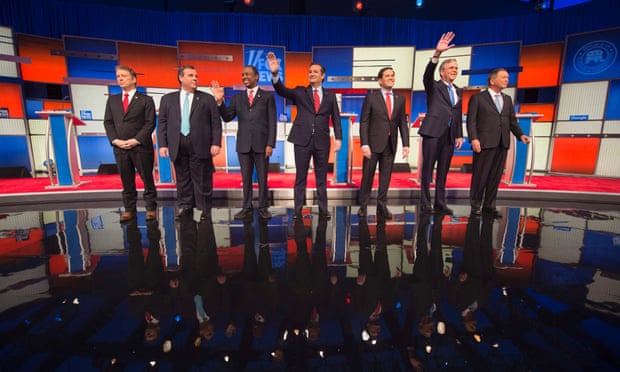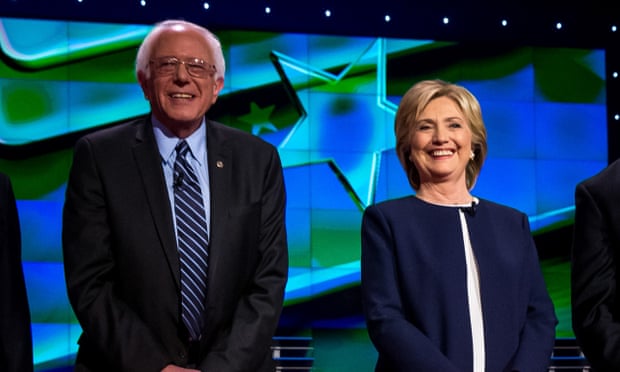Billionaire Republican backers host retreat with other super-rich conservatives as secret donations are forecast to break records in the 2016 election

The leading Republican presidential candidates, minus Donald Trump, at a debate in Des Moines, Iowa, on Thursday night. Photograph: Jim Watson/AFP/Getty Images
The billionaire Koch brothers are set to convene one of their famed retreats this weekend for several hundred of their fellow super-rich conservatives in Palm Springs, California, as observers forecast a record year for secret donations, dubbed dark money, to Koch-backed groups and other outfits from the NRA to the League of Conservation Voters.
New Yorker writer Jane Mayer examines the origins, rise and dominance of a billionaire class to whom money is no object when it comes to buying power
“Given the trends we’re seeing, we wouldn’t be surprised if dark money spent on direct advocacy [in the US 2016 election] hit half a billion dollars,” said Viveca Novak, the editorial director of the nonpartisan Center for Responsive Politics. “Spending by these groups in the 2016 cycle is way ahead of previous cycles, and [dark money groups] are more integrated into campaigns than we’ve seen in the past.”
In 2012, the center has reported, dark money groups spent over $300m, of which more than 80% came from Republican-leaning outfits.
Dark money is the name for cash given to nonprofit organizations that can receive unlimited donations from corporations, individuals and unions without disclosing their donors. Under IRS regulations these tax-exempt groups are supposed to be promoting “social welfare” and are not allowed to have politics as their primary purpose – so generally they have to spend less than half their funds directly promoting candidates. Other so-called “issue ads” paid for by these groups often look like thinly veiled campaign ads.
The boom in dark money spending in recent elections came in the wake of the supreme court’s 2010 Citizens United decision, which held that the first amendment allowed unlimited political spending by corporations and unions. That decision and other court rulings opened the floodgates to individuals, corporations and unions writing unlimited checks to outside groups, both Super Pacs and dark money outfits, which can directly promote federal candidates. Dark money spending rose from just under $6m in 2006 to $131m in 2010 following the decision, according to the CRP.
Several Republican congressional incumbents and candidates facing tough races are slated to attend the Koch retreat this weekend, and, if recent history is a guide, are expecting to gain support from Koch-backed dark money groups.
Florida congressman Ron DeSantis will be one of the lucky ones, according to conservative sources. DeSantis is seeking to replace senator and presidential candidate Marco Rubio – who is not running for re-election to the Senate in 2017 – and faces a GOP primary in August. As an invitee to the Koch confab, DeSantis has a good shot at benefitting from what the conservative network specializes in: hefty advertising support from the tax-exempt nonprofits that industrialists Charles and David Koch and their wealthy allies underwrite via unlimited and dark money.
DeSantis and other congressional guests are also hoping to see Super Pacs that support them receive checks that donors, thanks to the Citizens United decision, can write with no upper limit. Super Pacs are organizations independent of the candidates’ campaigns which, unlike the campaigns, may since Citizens United raise unlimited amounts of money from individual donors, corporations and unions. Unlike with dark money, these donations do require disclosure.
In recent years politicians attending Koch conferences have been the beneficiaries of considerable dark money support. In 2014, big ad spending by the Koch brothers-backed Americans for Prosperity group and other dark money allies proved instrumental in the Senate wins of Tom Cotton of Arkansas, Joni Ernst of Iowa and Cory Gardner of Colorado, all of whom attended a Koch retreat in mid 2014 and praised the donors for their help. And this election season AFP has already spent a few million dollars on ad blitzes to help endangered Republican incumbents including Rob Portman of Ohio and Kelly Ayotte of New Hampshire.
AFP and other Koch-network-backed dark money groups are widely expected to spend tens of millions of dollars more on advertising in some six Senate races to help GOP candidates, and will probably also spend money on ads to boost the Republican presidential nominee, despite concerns if the eventual nominee is Donald Trump, according to conservative sources. Charles Koch has stated that their donor network is aiming to spend at least $250m in this year’s elections and another $500m on conservative advocacy and research programs.
Several Koch network donors have voiced strong concerns about the rise of Trump, raising doubts about his conservative bona fides and his angry anti-immigrant rhetoric, which they fear could hurt efforts by the Koch network and the Republican party to appeal to Hispanics and minorities. “I hope he’ll moderate himself,” says Minnesota broadcasting billionaire Stan Hubbard. “He’s a great showman and knows how to get attention. He’s got to know when to turn that off and act like a potential president.”
Hubbard adds: “Trump wasn’t their choice,” referring to the Koch brothers network. “But they’re also realists. I believe you have to work with what you have.”
Historically, the bulk of the Koch network’s spending has flowed to AFP and another larger nonprofit, Freedom Partners Chamber of Commerce, which serves as a vehicle to funnel funds to numerous outfits such as the National Rifle Association and the US Chamber of Commerce, and is the official host of this weekend’s Koch donor retreat. A Super Pac, Freedom Partners Action Fund, which spent $23.4m in the 2014 midterm elections, will also get a chunk of the Koch network’s $250m.
Some Republican presidential campaigns have also been boosted by dark money for this election.
Rubio’s presidential run has benefitted by almost $10m in dark money spending by the Conservative Solutions Project. This nonprofit has spent mainly on ads that feature the Florida senator and tout his stances on key issues such as the Iran nuclear deal and tax increases, both of which he opposes.
Three watchdog groups have filed complaints with the IRS or Justice Department against the pro-Rubio nonprofit, charging among other things that it is providing Rubio a “private benefit” contrary to IRS rules, undermining its “social welfare” status. Jeff Sadosky, a spokesman for the Conservative Solutions Project, has dismissed the complaints and stated that its ads are designed to promote conservative issues not Rubio’s candidacy.
Another dark money behemoth, Crossroads GPS, cofounded in 2010 by George W Bush’s former strategist Karl Rove, is expected to spend millions of dollars this year on research and ads to help whoever wins the Republican nomination, says Steven Law, the group’s president. In 2012, the nonprofit poured over $70m into ads to boost Mitt Romney’s campaign and help Republican congressional candidates, according to campaign finance records.
Law also leads another dark money outfit, One Nation, which last year spent millions to help embattled Republican Senate candidates including Ayotte and Portman.
Meanwhile, a few Democratic allied nonprofits including one tied to David Brock, the ex-Clinton foe turned staunch ally, are poised to bolster Hillary Clinton’s campaign, while others like Patriot Majority USA are aimed at helping Democrats regain the Senate majority.
Over the last two years, American Bridge Foundation, the group founded by Brock, has funneled $3.7m into an allied Super Pac American Bridge 21st Century, according to the nonpartisan Sunlight Foundation. Brock is also on the board of the pro Clinton Super Pac Priorities USA Action which boasts an allied dark money outfit, Priorities USA.
This tsunami of dark money donations and spending by nonprofit groups does not seem to have been anticipated by the Citizens United decision. Justice Anthony Kennedy, in his majority opinion, envisioned a campaign finance system where all spending would be instantly disclosed via the internet, and outside groups would be completely independent from campaigns, thus limiting potential corruption.
In a recent speech at Harvard Law School, Kennedy acknowledged that disclosure was “not working the way it should”.
Some election law specialists fault the FEC and the IRS for failing to properly oversee the fast growing role of dark money. Ken Gross, a former counsel at the FEC who is now a partner with Skadden Arps Slate Meagher & Flom in Washington said: “The difficulties that the FEC and the IRS have had investigating the activities of these groups, has given them a fairly wide berth for operating,” which has led some dark money groups to exploit loopholes in order to circumvent political spending limit.
ABOVE IS FROM: http://www.theguardian.com/us-news/2016/jan/29/koch-brothers-donor-retreat-dark-money-2016-election





